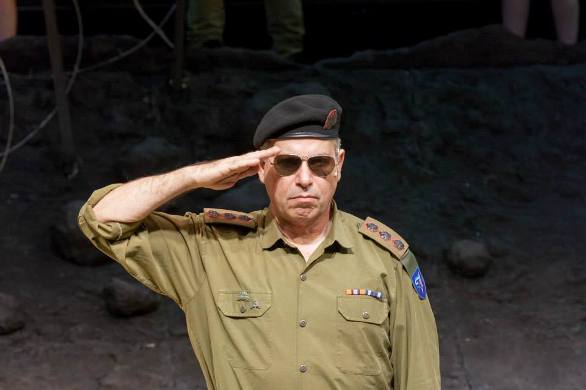
Gorodish is a profoundly moving and thought provoking play based on the life story of Shmuel “Gorodish” Gonen, hailed as a hero after the Six Day War, and vilified for his failures as Chief of the Southern Command during the Yom Kippur War. Written and directed by Hillel Mitelpunkt, it not only depicts the rise and fall of a tragic hero, it is the portrait of a generation of Israelis, the chronicles of an era that contribute to our understanding of today’s most burning issues. Sometimes a wound is so deep that its worst damage is hidden from view, the external symptoms are misleading, and it is only with the passage of time, often when it is too late to treat, that one realizes the full extent of the injury. So it has been with the Yom Kippur War, the greater our distance from this traumatic chapter in Israeli history, the better we are able to comprehend, with the aid of documents uncovered or newly made available, and the perspective of time, that this wound began to cut into our political-social fabric long before it began to bleed.
Gorodish is a compelling story of human emotions, ambition, loyalties and conflicts, an incredible drama with powerful performances, resonant and timeless. In a manner similar to Greek tragedy, the denouement is known: The Agranat Committee found that General Gorodish had failed in his command during the Yom Kippur War and he left Israel in ignominy, ostensibly to search for diamonds in Bangui (Central Republic of Africa), never to return. Mittlepunkt frames the play with an interview conducted by a well-known Israeli journalist, the late Adam Baruch, who traveled to Africa to meet with Gorodish.
One sees Gorodish (Natan Datner) in his decline, an aging man with bitter memories, in self-imposed exile in a far away country, his entourage down to the lawyer turned skeptical flunkey, Epstein (Alon Dahan), who finds his only solace in a flask. It is from this vantage point that the play takes us to 1967, just before the Six Day War, when 37 year old Shmuel Gonen, commander of the 7th Brigade, began to make the name Gorodish famous.
Gorodish was not a pleasant man, but he was an achiever and there were many who admired him, perhaps even more who feared him. Natan Datner imbues the character with a fierce energy and confidence that makes him loom larger than life. He conveys the complexity of his emotions and motivation in a way that allows the viewer to come closer to understanding, if not empathizing with this man. The excellent set design by Roni Toren has a topographical map of the conflict zone as its floor, while rocks and barbed wire are in the background, setting the tone. Gorodish emerges as an arrogant, powerful man who belittles and challenges those around him while he aims for his goals. He is a man who expects his orders to be followed without questions or comments; he never stops to question his methods or his goals.
Rules are imposed with ruthless precision, he is obsessed with externalities. Aiming to reduce the number of car accidents in his unit, he has no qualms about the means used to reach this goal, as long as the numbers look good. He even defends his questionable strategies by saying, “terror is a means to an end, and if it achieves the goal then it is a good means.” He is blunt and brutal: telling a soldier/secretary that she is ugly, and telling a military Rabbi that he is fat. These scenes are not without their humor, one sees the ridiculous aspect of this arrogant officer. When the former Yeshiva student quotes the Talmud as a prelude to sex with his secretary, the humor takes on a bitter taste of recognition; these scenes of ‘military life’ are all too familiar.
For many Israelis this play will strike a chord of recognition, the scenes of army life with its anxiety, boredom and camaraderie, the politics behind the scenes and the corruption as well as the unwavering loyalty, courage, and ideals. It is a play that is about who we used to be as a society and who we have become, who we thought we were and who we are. Although based on real people and events, Mittlepunkt’s play is emphatically a work of art, a drama that evokes awe and fear, as well as laughter. Music is a central element in the play, much as it has been in Israeli culture. Familiar songs and the marching beat of percussion evoke complex memories and emotions. One recalls the nostalgic warmth of songs that inspire a sense of belong and togetherness, or the rallying rhythms of a call to arms; yet one is always aware that this same music is also intended to evoke those feelings.
A powerful motif within this play is the soldier Friedman (Yuval Segal), who was so desperate to become a part of the 7th Brigade that he lied on his medical exam. Try though he might, he cannot fit in, yet he cannot liberate himself from the ideology that brought him to this place, the belief in his commanders and in the system, that compels him to obey, even at the cost of his own destruction. Wronged by the system, he cannot bring himself to call it wrong. Through his narrative, a common military form of punishment becomes a symbol of the absurd aspects of military logic, and its power to wound the psyche. Segal’s Friedman is an innocent to the end, with an anxiety that feels genuine. Real life characters are convincingly portrayed here, including a nice appearance by Dawn Nadel as Golda Meir that conveys the cozy grandmotherly appeal of the former Israeli Prime Minister, as well as the canny, calculating politician.
If Gorodish is a figure larger than life, the hero, then Epstein (Alon Dahan) is the one who defines the human scale. It is no coincidence that Gorodish’s memorable victory speech – “We looked death straight in the face, and it lowered its eyes at us” – is followed by a scene between the journalist Adam Baruch and Epstein in Africa, a reminder of the consequences of the Yom Kippur War for a nation and a generation, and perhaps a suggestion that this war was also one of the consequences of that previous war, so glorious in its time. Epstein enters the story as an ambitious clerk with the ability to bend facts to fit the situation, all this to the benefit of Gorodish, who quickly assigns him to his unit.
Dahan is funny, sleazy and slick, exuding a hilarious amorality. Opportunist par excellence, and a true believer that the ends justify the means, Epstein sticks with Gorodish through the years. As the general prepares for his questioning by the Agranat Committee, Epstein, now a lawyer, comes to help out. He’s no longer the same man that he was in 1967, or in the post-war heyday when heroes set the agenda. He’s lived through another war, one that left his generation shattered. Dahan delivers Epstein’s words with the heartbreaking force of a man who has looked at everything he ever believed in and found the center hollow. For me, and for the audience that burst into applause, Epstein’s words were the place where Mittlepunkt touches the bleeding wound at its source: “Do I believe that my government would prefer conquest over peace?”
Gorodish
Written and directed by Hillel Mitelpunkt
Set design: Roni Toren; Music: Ori Vidislavski; Costumes: Orna Smorgonsky; Lighting: Avi Yona Bueno (Bambi); Percussion orchestration: Asaf Rot; Cast: Natan Datner – Gorodish, Alon Dahan – Epstein; Ohad Shachar/Micha Selektar – Adam Baruch, a journalist; Motti Katz – Moshe Dayan; Tamar Shem Or – Lieutenant Dalia; Yarden Bracha – Nitza; Eran Sarel – Military Rabbi; Shoham Sheiner/Amit Reis – Second Lieutenant Carmeli; Avi Termin – Leon Cohen, lawyer; Ido Musseri – Pachima; Yuval Segal – Friedman; Nadav Assulin – Sergeant-Major Bardugo; Eran Sarel – Ulrich, a sculptor; Yigael Zachs – Gilboa, a journalist; Edna Balilus – Um Nagi, a blind old lady; Dawn Nadel – Golda Meir, Prime Minister; Nadav Assulin – an old Druze; Yigael Zachs – General Gudrian; Musicians: Asaf Rot – conductor/percussion, Oded Geizhals – drums/extras; Tremolo percussion ensemble – Lior Eldad, Tomer Galili, Ziv Kaplan, Eran Margalit, Nadaav Ovadia, Daniel Solomonov, Effie Striem, Yoav Tzarfati; Ettie Tevel – accordiaon.
Gorodish is performed in Hebrew, some performances are accompanied by subtitles in English. Consult the Cameri Theatre website for tickets and dates. The next English subtitled performance will take place on February 21, 2015.





